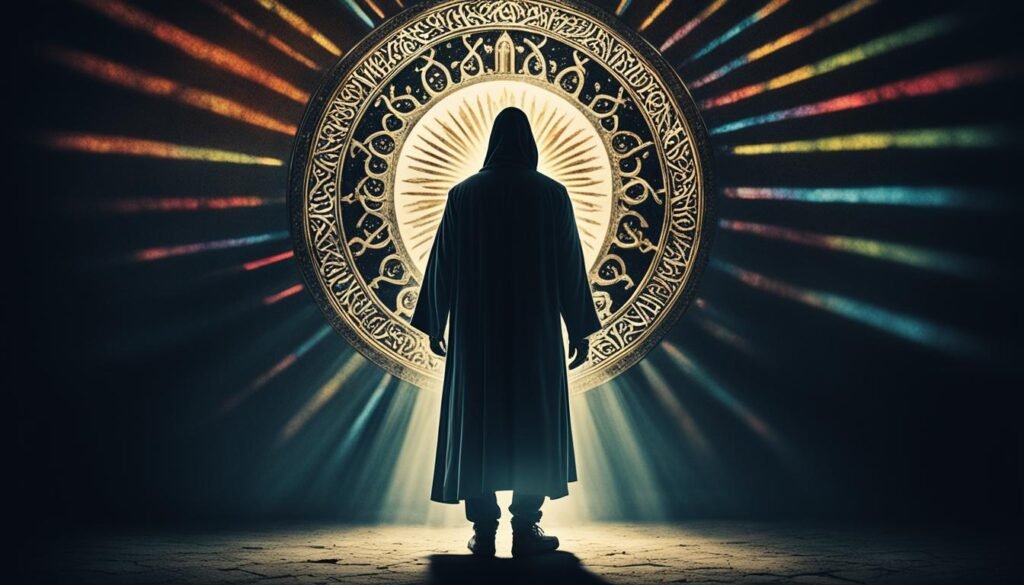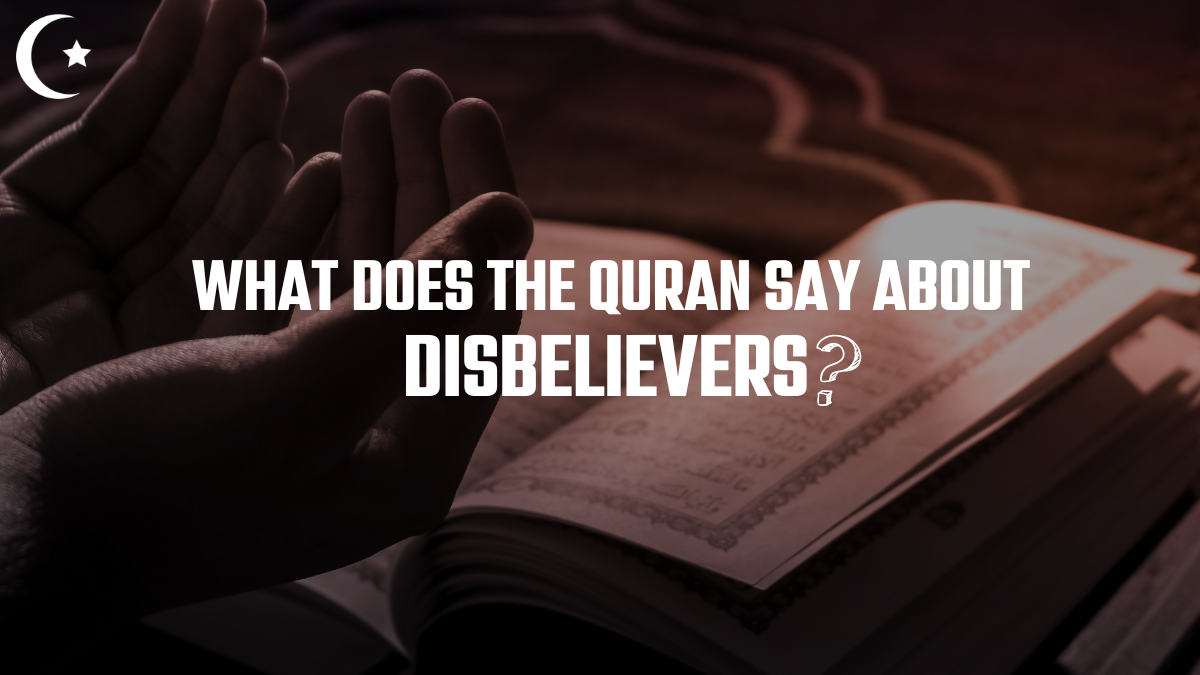Have you ever thought about why the Quran talks about disbelievers in a strong way? What Does The Quran Say About Disbelievers? It shows us the harsh consequences for those who don’t believe. The Quran says all disbelievers will face punishment after death. This piece looks into what the Quran says about those who don’t believe, touching on human relationships, justice, and the big effects of not believing.
The Quran is clear: no disbeliever gets a break in the afterlife. They won’t have any share there. We’ll explore the serious nature of these words and what they mean for our beliefs, how we connect with others, and the outcomes of not believing.

Understanding Disbelief in Islam
Disbelief in Islam is called “Kufr.” It means not accepting key beliefs like God’s oneness, Muhammad’s prophethood, and the Quran’s revelations. This belief gap creates a big divide from spiritual truth. The Quran explains what disbelief is and its effects on those who believe it.
From the Islamic perspective on non-believers, they are seen as spiritually blind and unaware. The Quran says Allah guides some but leads others astray. This shows a divine control over belief or disbelief in someone’s heart. In Surah Al-Baqarah, it’s said people are tested to show their true nature. Some may be misled, while others find the right path.
Disbelief can be scary because Allah talks about sealing hearts, hearing, and vision. This makes people disconnected from spiritual truths. Long-term disbelief can cause spiritual and mental health issues, making a person less human and leading to eternal consequences. Repeatedly rejecting truth shows pride, selfishness, and ignorance, making it hard to see one’s spiritual problems.
Disbelief can make a person’s heart and mind close off to guidance over time. Allah allows disbelief to grow as a punishment. Those who keep rejecting truth may lose their chance for divine guidance, ending with their hearts sealed forever. This constant fight against spiritual truth can also break a person’s moral compass, making it hard to know right from wrong.
The Concept of Disbelievers in the Quran
The Quran talks about disbelievers in detail, showing different kinds and traits. It divides them into those who reject faith, pretend to believe, and those who don’t care about Islam. Quran 2:171 compares disbelievers to cattle or sheep, showing they lack understanding and awareness.
The Quran has strong words for unbelievers, calling them “the worst living creatures” in Quran 8:22. This shows how Allah sees those who don’t believe. Quran 8:55 also says disbelievers are the worst creatures and don’t change their ways.
Polytheists are seen very negatively in the Quran. Quran 9:28 calls them unclean, showing how much contempt is there for such beliefs. Quran 98:6 warns that disbelievers, including polytheists, will face harsh punishment after death.
Allah strongly disapproves of disbelievers’ actions against believers, as Quran 3:147 says He won’t let them win over the faithful. This idea is repeated in many verses, highlighting the big gap between believers and non-believers.
What Does The Quran Say About Disbelievers
The Quran clearly states its view on disbelief. It shares deep messages about ignoring Allah’s teachings. It shows disbelievers will face severe outcomes for rejecting God’s messages.
Clear Communications Regarding Disbelief
Many verses talk about the bad outcomes of disbelief. For instance, Quran 8:55 says, “Indeed, the worst of living creatures in the sight of Allah are those who will have disbelieved, and they will not ever believe.” This shows how serious rejecting Allah is. The Quran says those who don’t accept divine guidance face harsh consequences.
It calls disbelievers without mercy or guidance. Their refusal to accept guidance leads to eternal punishment in the afterlife.
The Consequences of Denying Allah
The Quran paints a clear picture of what awaits the deniers. Quran 98:6 says, “Indeed, they who disbelieve among the People of the Scripture and the polytheists will be in the fire of Hell, abiding eternally therein. Those are the worst of creatures.” This shows a clear warning and reality for those choosing disbelief over faith.
The fate is compared to “the Blaze” in Quran 33:64. This highlights the need for belief to gain divine compassion. For more insight, check out this discussion.
The Sealing of Hearts and Its Implications
Understanding the sealing of hearts in the Quran means knowing that Allah puts barriers on disbelievers’ hearts. This stops them from seeing the truth. It shows a deep spiritual gap between faith and the individual.
The Quran says Allah seals the hearts, ears, and eyes of those who don’t believe. This happens because they keep rejecting faith. It’s a sign of a deep spiritual issue.
Most translations agree that the sealing of hearts is a real thing. They all say that hearts get sealed and eyes get covered. This shows a severe punishment for not believing.
Disbelieving can lead to spiritual barriers. This is shown through symbols like sealed hearts and ears. These symbols tell us that not believing can cause spiritual walls to go up.
The Quran talks a lot about the heart, hearing, and sight. It says understanding and belief start from within. This shows how important the mind is in keeping faith strong.
The sealing of hearts is like rejecting faith. It leads to big problems. This idea is shown in the Quran through stories and symbols.

Disbelievers slowly move away from faith, just like the Quran describes. Sin can cover the heart, making it hard to see the truth. This can make people feel like they’re rejecting everything.
The Quran tells believers to stay strong in their faith. Understanding this helps us see how conviction affects us and others. The link between disbelief and sealed hearts is a big theme in the Quran. It shows the big effects disbelief has on people.
Disbelievers and Their Actions
The Quran talks about the actions of disbelievers. It points out hypocrisy in Islam and how some people hide their true thoughts. They pretend to be something they’re not, which hurts the faith of believers.
This makes it easy for deceptive behavior of unbelievers to spread. This harms their own spiritual health.
Hypocrisy and False Claims of Belief
Hypocrisy is a big issue in the Quran. Some people say they believe but don’t act like it. This is a warning that such actions have big consequences now and later.
The Quran says those who act like they don’t believe in what they say will face big problems.
Deception Against Believers
Unbelievers often try to shake the faith of believers. This is not just personal; it’s against the whole faith community. The Quran shows how these actions hurt the deceivers themselves.
It tells them they can’t escape the bad effects of their choices. The Quran urges them to see how they hurt themselves.
Rewards and Punishments for Disbelievers
The Quran clearly shows the difference between believing and not believing. It says that wealth and family won’t protect disbelievers from God’s judgment. Hell is their eternal home if they reject faith, filled with endless torment.
This torment is constant and never stops, showing the harsh outcome of not believing in Islam.
Some verses compare the actions of disbelievers to dust blown away by a storm. This shows how useless their efforts are. The Quran also says that those who fight against the prophets will be destroyed. But, the saints of Allah will win on Earth.
The prophets asked for victory through prayer and got it against their enemies.
About 101 to 200 verses in the Quran talk about the punishments for those who don’t believe. If people ignore God’s guidance, they face big problems and shame. Sura 2:217 says leaving Islam means losing all good deeds and going to eternal fire.
Believers get rewards for their good actions, while disbelievers face harsh punishments. This is a key message in the Quran.
Not believing in faith leads to harsh judgments and big punishments. The Quran promises that good deeds are noticed and rewarded. Disbelievers will face the effects of their actions, leading to a huge and lasting imbalance.
You may also be interested in:
Historical Context of Quranic Verses on Disbelief
The Quran’s verses on disbelief have a deep historical background. They were revealed during tough times for early Muslims in Mecca and later in Medina. These verses show the early Islamic community’s struggles and strength against harsh forces.
During these hard times, the Quran spoke to the disbelievers, guiding them and stressing the importance of faith. The term *kufr* means denying Allah and His messengers. It’s used in the Quran to describe different kinds of disbelief and rejection throughout history. Many verses also encourage believers to keep going, seeing challenges as tests of their faith.
Early Muslims faced both outside and inside challenges, making them think deeply about their beliefs. Misunderstanding these verses has led to conflicts over time. Studies show a big part of these misunderstandings, showing why we need to understand these verses in their full context. This helps improve understanding between different faiths.
The Role of Guidance and Misguidance
The Quran makes it clear what guidance in Islam means and what misguidance is. It talks about this topic in about 33% of its verses. It says guidance is a gift from Allah for believers. People have the freedom to choose, which is shown in 25% of these verses.
This freedom lets people decide if they will follow or ignore Allah’s guidance. This choice greatly affects their spiritual path.
Some verses, about 15%, explain what happens if you deny the truth. They say rejecting Allah’s messages can lead to spiritual decline. The Quran also tells us to think about our choices, which is in 10% of its verses.
It encourages believers to really think about their decisions to avoid misguidance. This is very important because 20% of the Quran talks about the need to follow its teachings to stay on the right path.
The way divine guidance and human choices connect is complex. Quranic verses like TMQ 14:4 say Allah guides some people and lets others make wrong choices. This shows how important it is for us to decide if we want guidance or not.
It also tells us that we all face the results of our actions. If we ignore the divine guidance, we might not understand the Quran fully. This can block us from learning its deep teachings.
There are over 1.6 billion Muslims worldwide who follow the Quran. Many people who were once seen as disbelievers changed after getting divine guidance. This shows how powerful Allah’s message is.
Examples of people who became Muslims show that change is possible. This happens when someone really thinks about their beliefs and looks for the truth.
Comparison of Believers and Disbelievers in the Quran
The Quran clearly shows the differences between believers and disbelievers. It explains how believers see Allah’s signs, while disbelievers don’t. These differences affect their spiritual paths and final outcomes.
The Guardian of Believers
Believers have divine guardianship, giving them strength and guidance. They focus on the Hereafter, not the world, unlike disbelievers. Messengers guide believers, who accept the truth, while disbelievers reject it.
Believers see their successes and challenges as Allah’s will. Disbelievers think it’s all about their own efforts. This shows faith’s importance, as believers know they’ll be judged in the Hereafter. Disbelievers often ignore this, affecting their moral and spiritual paths.
The Quran reminds believers to seek wisdom and guidance. Disbelievers often ignore this advice. True believers look forward to paradise, while disbelievers face regretful punishments. This shows the importance of faith and doing right.
Believers show their faith through prayer, humility, and obeying Allah. These actions set them apart from disbelievers. Quranic comparisons show how faith changes lives and destinies.
Interpretations of Violence Against Disbelievers
Many verses in the Quran talk about violence against those who don’t believe. This has led to a lot of debate among scholars and followers. They say we must look at these verses in the context of when they were written.
They believe these violent words were mainly in response to the oppression early Muslims faced. This view helps us see the Quran in a more detailed way. The Quran clearly says there should be no force in matters of faith, showing the value of free belief.
Also, Quran 2:190 limits fighting to self-defense. This shows that fighting is only right when you’re defending yourself or when others break a treaty with you. This supports the idea that peaceful verses are more important than violent ones.
The “sword verses” (like 9:5 and 9:29) don’t tell us to fight all non-believers without a reason. They set conditions for when it’s okay to act. The Quran also stresses justice and treating everyone fairly, showing that kindness is preferred over hostility towards others.
These discussions suggest that Islam values life, fairness, and living in peace with others. The Quran teaches us to protect human life and fight against oppression, not against people. So, understanding Quranic violence means seeing it as part of a larger message of compassion and justice.
Interactions Between Muslims and Disbelievers
The Quran teaches us to be kind and understanding with those who don’t share our faith. It’s important to be respectful and kind when we meet people from different beliefs. This helps us live together peacefully in harmony.
The Prophet Muhammad showed us how to be good friends with people of other faiths, even family members. He taught us to respect everyone, no matter their beliefs. This is key to building strong relationships.
One story tells of the Prophet visiting a sick Jewish boy. He showed great compassion and gently shared the message of Islam. He also exchanged gifts with non-Muslims, showing goodwill and the value of kindness.
The Quran tells us to be fair and kind to those who haven’t wronged us. This is especially important for Muslims who live in the minority. Treating others with respect, as the Prophet taught, helps us all live together in peace.
History shows that Muslims, Jews, and Christians have lived together peacefully in many places. They found common ground and valued their shared humanity. This approach helped them build strong communities and a more welcoming society.
The Future of Disbelievers According to the Quran
The Quran shows a dark view of the future for those who don’t believe. It says they will face eternal damnation. This shows that their actions will lead to a severe punishment, as predicted by the Quran.
Those who lie and ignore Allah’s signs are seen as the ultimate losers. They will face the consequences of their choices. This idea makes it clear that disbelievers will pay for their actions.
Islam teaches that disbelievers have a chance to change before punishment comes. But, the Quran warns that this punishment will come suddenly. It will shatter any false sense of security they may have.
The Quran describes a torment that comes from above and below. This shows that the punishment is complete and cannot be escaped. It’s a strong warning about the dangers of not believing.
The Quran also says that the punishment of disbelievers reflects their actions on earth. It tells them to “Taste now what you were doing.” This shows a deep psychological aspect to their punishment. It warns us all to choose righteousness and faith to avoid a bad future.
FAQ
What Does The Quran Say About Disbelievers?
How does the Quran categorize disbelievers?
What are the implications of the ‘sealing of hearts’ mentioned in the Quran?
How does the Quran address hypocrisy among disbelievers?
What are the rewards for believers and punishments for disbelievers in the Quran?
What historical context surrounds the Quranic verses on disbelief?
How does the Quran distinguish between guidance and misguidance?
What does the Quran say about the future of disbelievers?
How should Muslims interact with disbelievers according to the Quran?

Embracing Faith, One Insight at a Time!
The teachings of the Quran have always guided my path. With a deep passion for Islamic knowledge, I strive to blend the wisdom of tradition with the relevance of today, making the timeless messages of Islam accessible and meaningful for everyone.
Muslim Culture Hub is my platform to share historical insights and thought-provoking articles, exploring both well-known and lesser-discussed aspects of Islamic culture and beliefs. My mission is to create an inclusive online space where everyone can learn, strengthen their faith, and connect with the profound message of Islam.
Join the journey!
May peace be upon you.








